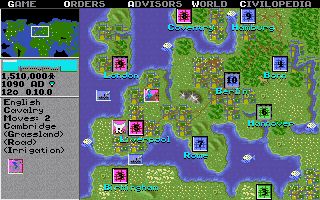Future Technology #1
(or The Shape of Things to Come)
 |
| Future technology, earlier today |
 |
| Civilisation, back in the '90s |
(Aside, for the uninitiated: a "technology tree" is a set of available upgrades in a video game. The player typically has some sort of resources to spend on upgrades and chooses which to develop next. Upgrades give benefits in the game and unlock the later technologies. It's just like life.)
However, it is a tenet of geek philosophy that there is no end to the technology tree, and game designers are a sub-species of geek, so beyond the end of the tree lay more technologies:
- Future Technology #1
- Future Technology #2
- And so on...
...but I loved this idea ever since I first saw it. Future Technology #1 is wonderfully non-specific, whilst saying precisely what it means.
FT#1 could be a pocket hadron collider, smartpants (tm), or an ambiguous phase psycho-encapsulator (which we all could use, if you think about it...)
It could be tomorrow, or a thousand years hence.
And if we achieve FT#1 then there's FT#2 (henceforth to be known as FT#1).
So what is FT#1 for poetry? I feel strongly that there ought to be something: a killer app for the Sonnet that takes it somewhere it's never been before and makes everybody say: Well obviously I bought one; I can't understand why nobody thought of it sooner!
Which is not to say that poetry-1.0 (poet stands at front and declaims) or poetry-2.0 (words arranged on page) have had their day. Far from it, poetry-1.1 (poet on radio/TV/YouTube) is quite popular, and 2.1 (words arranged on internet) has a variety of interesting new angles, but neither of those feels like a real FT, they've basically still just words in sequence, or words arranged in a space.
So every now and then I have a go. I started with an example of animated poetry, but while that was pretty popular, it's basically a movie and as nicely as self-editing text works for that idea, I am not sure it extends to many other poems... (see however Kinematic Typograthy.)
It ought to be possible to do more than mere animation, and Jenn Zed (of whom more later) has suggested that videos turn the poetry consumer off. I hadn't realised it, but I recognise it in myself, and I think it is similar to poetry vs. lyrics An element of time travel is involved in reading a poem — the eye tracks up and down the page, effectively forwards and back in time — which it can't when listening to a song, as the music proceeds at constant rate.
Something similar applies to videos. A voice recording of a poem, accompanied by still text, doesn't suffer quite so badly, because the eye can still do a little out-of-order processing but a moving video is really hard to get right, because it is simultaneously distracting the eye, and locking the words into a fixed time-frame.
For lyrics, the fix was to adjust the words, you fit them into the experience already created by the music...
However for poetry-FT#1 I want the reverse. What happens when we fit the medium as closely as possible to the words? If the user (reader) needs to control time, then why not let them?
Well I don't know.
I'm still working on it. It isn't easy. It's not that poetry's difficult (I think that goes without saying) or that technology is hard to master (although certainly it can be awkward.) The real problem is, in a world where:
this or this or even this
are easy to achieve...
are easy to achieve...
...what do they mean? It's more or less a brand new medium, so it doesn't have any established rules. I'm basically inventing everything from scratch, albeit with wanton theft from books, films, video games and comic books.
Anyway, a new attempt on FT#1 is under way. I am working with the aforementioned Jenn Zed (who has poetic inclinations and is an accomplished artist...) This is "mixed media" by which I mean "words and images and Javascript and HTML and CSS and mp3 and anything else that seems to fit..."
It's not huge, but it's slow going... It will probably take at least another six months, but until then:
 |
| Installing FT#1 25% Please Wait |







